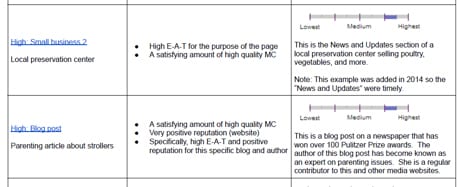SEO Guides, Tips & More!
Learn from Our Experience
Quality Content Search – What is E-A-T?
To take advantage of the various ranking opportunities it’s essential to get inside the mind of Google to understand what they are looking for and how to position your company’s website and content. In prior blog posts, we have discussed several of the Google SERP features, how to rank for them and other opportunities to consider. Targeting these features as part of your overall approach is important as they will enhance your click through rate. However, it’s also important to understand how Google identifies, evaluates and ranks websites and its content. Several years ago, an unofficial version of the Google Search Quality Evaluator Guidelines was “leaked” offering a glimpse into how Google evaluates content. There is a lot of useful information available, but perhaps the most relevant to marketers are the most important rating factors to page quality and the concept of “E-A-T”. This information represents the essential methods used by Google to determine the quality of a page. Marketers and business managers need to develop a broad understanding of this to ensure they can maintain and create new content that is consistently rated well.
What is E-A-T?
This is an acronym that stands for Expertise, Authoritativeness, and Trustworthiness. According to the Guide, Google uses this information not only to determine the purpose of the page but also the level of authority and trustworthiness the content has. As an example, it is suggested that content be evaluated to determine the expertise of the content creator, whether they are authoritative (have the proper credentials, education or practical experience in a specific field), and if they are trustworthy. It’s important to understand this not only applies to the author but the company and its website. If a site is poorly designed, offers no valuable information and doesn’t have a purpose, then it’s unlikely to have a high EAT rating. In fact, it is specifically stated within the guide to, “Think about the topic of the page. What kind of expertise is required for the page to achieve its purpose well? The standard for expertise depends on the topic of the page.”
What Makes a Quality Page?
While EAT is essential to gaining a good page quality score with Google, there are other insights offered in the Guide that reveal what marketers should be looking for when reviewing their site. Below is a brief discussion of the metrics outlined, including:
- High E-A-T– As outlined above it’s important for a website and the connected authors to have a high level of E-A-T. This makes it easier for Google (and other search engines) to not only understand the purpose of website but also identify that you are trustworthy. For this reason, it’s important to understand that the content on your site should be educational in nature and provide a solution to your target market concerns. It’s okay if the content highlights your service or product as a solution but spend most of the content “time” on the audience’s needs and steps to solving issues.
- Satisfying Amount of High-Quality Main Content– Google is looking for content that relates to the purpose of the website and required time, effort, expertise and skill to create and publish. In other words, it will likely not be content that was written or created in 15 minutes. According to the guide, “For news articles and information pages, high quality MC must be factually accurate for the topic and must be supported by expert consensus where such consensus exists.” One take away from this excerpt is that the content must be supported by consensus. It used to be that outbound links were considered less desirable than inbound links. However, to demonstrate the utility of the content and context within the related communities’ opinion, it is important to sometimes include outbound links.

- Satisfying Website Information– This relates highly to the E-A-T level but specifically addresses the transparency around who is responsible for the website and that the individual or company is trustable. Marketers should make certain information about their experts is easily available and important information such as professional biographies with educational and credential information is also This ensures that Google, as well as site visitors can learn about your team. Also be sure that the appropriate technical details are transparent as well.
- Positive Reputation –Google wants to make sure that websites with high page quality scores are rewarded with a positive reputation. While some pages can be rated as high-quality content without a positive rating, it’s unlikely a website with a negative review will receive a high rating. “Whilea page can merit the High rating with no reputation, the Highrating cannot be used for any website that has a convincing negative reputation.” This criterion reveals the importance of having and managing positive online ratings. Many companies prefer not to ask customers/clients to give online reviews, BUT they are very powerful and can impact the company’s rankings.
High Quality Page Examples

Taking Charge
Change is a process that takes time. This is especially true when implementing a new SEM or content marketing strategy. The information highlighted above provides general insights into how marketers and business owners can shape and influence their efforts to broadly gain higher rankings. As the end of year approaches, now is the time to take stock of your company’s approach and see what insights such guides from Google can offer to help shape your process.

